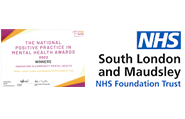Coping with unusual experiences
When struggling with unusual experiences many people look for ways to cope and make sense of what's happening. A good place to start is to think about whether there is anything you already do that is helpful. When trying out new strategies, keep an open mind - you might be surprised by what can be useful! Don’t worry if it takes some time, everyone is unique and you might not find the right strategy straight away.
Below are some suggestions that we have found helpful in reducing the distress and impact of unusual experiences. Lots of these are based on what the people we support have recommended.
As you read on, you'll find links to download some self-help documents that we hope will be useful.
Physical and emotional wellbeing is really important for all of us, regardless of whether we have unusual experiences. Lots of factors will affect our general well-being. For most people, looking after ourselves will mean being aware of things like physical health, diet, exercise, sleep, how we manage stress, and how we spend our time. All of these will make a difference to how we feel day to day.

I think making sure that I get enough sleep more than anything [helps me to stay well] because if I don’t get enough sleep I won’t focus properly and the entire world will go off schedule. And making sure that I exercise and eat well and stuff, because when I am doing yoga it makes me focus more on what is going on in my body rather than my head.
Click here to download our tips for general wellbeing and staying well.
Understanding our experiences better can be an important part of coping with them. Many people find it useful to notice what seems to trigger their unusual experiences, and by doing so we make them more predictable. Some people find that they even feel more in control, or that the experiences seem less scary.
It can also be helpful to pay attention to things that have a positive impact. For example, some people find that they don't have unusual experiences as much when they're doing something enjoyable or meaningful.
Of course, at the beginning it can feel difficult to identify what makes unusual experiences better or worse. Some people find that keeping a diary or record of these experiences helps with this, even if it's just in a phone.

Whenever I’m stressed it gets a lot worse, or whenever I am loading myself up on work more than anything, everything kind of builds up in general. So that always makes it a lot worse. So just remembering to have like relaxing times myself helps it to not get too overwhelming.
Sometimes people worry that they are the only ones having unusual experiences. As you might have read in the ‘Unusual Experiences’ section, these experiences are actually quite common. For some people, knowing that others have similar experiences might make them seem less frightening or change the way they are seen.
It can be a comfort to know that you're not alone. Some people find it helpful to share their experiences with others, and hear from other people about how they have understood and managed their difficulties
If you'd like to hear more about other peoples' experiences, have a read of our Real Stories section.
When we feel down, anxious or distressed, it's much more difficult to go about our everyday lives. You might find that you've started to spend more time on your own, and may be avoiding things you used to enjoy - like spending time with friends, or going to work or university.
Although time for rest and relaxation is helpful, we know that staying active and engaged with the things that are important to us has a significant positive impact on our mental health.
You can start by bringing to mind some of the things that are most important to you, and that you'd like to spend your time on. If you're going through a hard time it may be that these important things don't feature much in your day to day life right now. All of us need three types of activity on a regular basis to feel positive:
1) Activities or experiences that make us feel enjoyment or pleasure (like watching a film or having our favourite food)
2) Activities or experiences that makes us feel achievement or satisfaction (like going to the gym or getting some work done)
3) Activities or experiences that make us feel connected to other people and the world (like meeting up with a friend or going for a walk in the park)
If you find that your average week at the moment doesn't include activities that give you any of these feelings, then try to plan differently for the week ahead. Ideally it's good to have a balance of all three. If anything begins to feel overwhelming, remember you can make changes in really small steps.
We all have periods of feeling anxious or stressed, and unusual experiences like hearing voices or feeling paranoid can make us feel particularly anxious. Finding effective ways to relax is an important part of looking after our mental health.
Some people find exercise, yoga or mindfulness helpful. Others feel that reading, talking to a friend or family member, listening to music, or doing something creative is useful. Specific relaxation exercises can also be helpful ways to bring anxiety down. The important thing is to find what works for you.
Most of the time, we feel anxious when we perceive some kind of threat or start thinking that something bad is going to happen. Our bodies then respond to this "threat message" with physical symptoms of anxiety. So, in these moments any activity that either a) distracts our minds from the worry, b) reassures us we'll be okay, or c) calms the physical symptoms of anxiety, will be helpful.
If you already have healthy strategies for relaxing then try to practise these at times when things are okay, and not only in moments of high anxiety. Some people find that alcohol and drugs ease their anxiety, but you'll find that this only works in the short term and often ends up making the problem worse. If you're looking for something new to try, have a look at the link below.
Click here to download our suggestions for different types of relaxation exercises.
We often find ourselves thinking over and over about something upsetting or distressing, which often just fuels our distress further. A simple way to try and cope in the moment is to try shifting our attention on to something else. Distracting ourselves can help change these negative emotions and make things feel more manageable.
As mentioned in the last section, we feel anxious when our mind perceives some kind of threat or worry. The physical feeling of anxiety is our body's attempt to prepare for this threat. Often we know we're not in real danger, but we keep feeling anxious anyway! At these times, distracting our minds from the idea of threat will result in the body's response calming down.
When we feel anxious, or have unusual experiences like hearing voices or feeling paranoid, it's easy to get swept up in the emotion and react very quickly. This is understandable but may not always be helpful. Instead, try to pause. Take a step back and follow the steps below.
STOP: Stop and mentally step back. Try to not react immediately.
TAKE A BREATH: Try to take a deep breath and pay attention to what it feels like as you breathe in and out.
OBSERVE: Notice what you are feeling and thinking. If you're worried about something, is this fact or opinion? Are you thinking the worst, or jumping to conclusions? Where is your attention focused? How do you feel in your body?
PULL BACK: Try to put things in perspective. Could you look at this situation another way? Are there any other possibilities or explanations? What would a friend or family member say? How important is this and will I think the same in 6 months? Is how I feel proportionate, or has my reaction been influenced by something else?
PRACTICE: Practice what works for you and what you find helpful. How would you like to respond? What would be the consequences of this? How does this fit with your values and what you feel is important? What would be the best and most helpful response in this situation?
Many people hear voices, or see or sense things that other people don’t. There are many different versions of these experiences, both positive and negative. For some people, these experiences can be distressing and can have an impact on their lives. If you're struggling with unusual experiences then it might be helpful to learn more about how they can be managed.
Click here for some advice on dealing with scary voices.
This material has been developed by Voice Collective.







